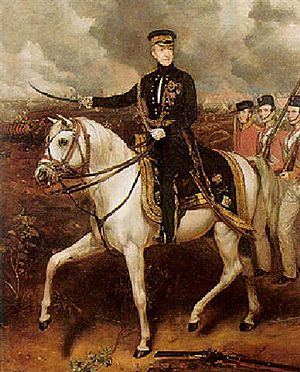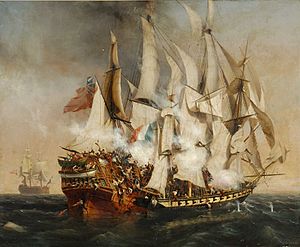John Hunter Littler facts for kids
Quick facts for kids
Sir
John Hunter Littler
KCB
|
|
|---|---|

A Stephen Pearce portrait of Littler as a lieutenant-general
|
|
| Born | 6 January 1783 Tarvin, Cheshire |
| Died | 18 February 1856 (aged 73) Buckfastleigh, Devon |
| Buried |
Tarvin, Cheshire
|
| Allegiance | |
| Service/ |
|
| Years of service |
|
| Rank | Lieutenant-general |
| Unit | Bengal Army |
| Battles/wars |
|
| Spouse(s) | Helen Olympia Stewart |
| Children | Four daughters |
Sir John Hunter Littler (born 1783, died 1856) was an important officer in the East India Company's Bengal Army. He joined the army at 17 as an ensign (a junior officer) and sailed to India. His ship, the Kent, was captured by French pirates! He had to finish his journey in a small boat called a pinnace. He fought in early wars, like the Second Anglo-Maratha War and the invasion of Java.
In 1841, Littler became a major-general, leading a large group of soldiers. He fought in the Gwalior campaign in 1843. The British Parliament thanked him, and he received a special award called the Companion of the Order of the Bath. During the First Anglo-Sikh War (1845-1846), he led his division at the Battle of Ferozeshah, again earning thanks from Parliament. After the war, Littler was in charge of British troops in Lahore, the Sikh capital. In 1848, he joined the top government group in India, the Supreme Council. He also became the deputy governor of Bengal and received a higher award, Knight Commander of the Order of the Bath. He returned to England in 1851 and lived out his final years in Buckfastleigh.
Contents
Early Life and Family
John Hunter Littler was born on January 6, 1783, in Tarvin, a village in Cheshire, England. His family had lived in Tarvin for many years. His mother, Diana, was the daughter of John Hunter, who was a director of the East India Company (EIC). John Littler went to grammar school in Acton.
Joining the East India Company Army
On August 19, 1800, Littler became an ensign in the EIC's Bengal Army. He was assigned to the 10th Regiment of Bengal Native Infantry. Littler traveled to India on a large ship called the Kent, along with 400 other soldiers.
On October 7, 1800, the Kent was stopped in the Bay of Bengal by a French privateer (a private ship acting like a pirate) named Confiance. This French ship was led by Robert Surcouf. After a short fight, the Kent surrendered, and its captain was killed. The French took the Kent, but they let the passengers go. Littler and the others were put on a small boat called a pinnace, which safely reached British India.
Littler was promoted to lieutenant on November 29, 1800. From 1804 to 1805, he served in Lord Lake's army during the Second Anglo-Maratha War. He also took part in the 1811 mission to capture Java from the French. On December 16, 1812, he became a captain. He returned to India in 1816 and worked in Lord Hastings' army until 1824. He was promoted to major on September 22, 1824.
Littler married Helen Olympia Stewart on June 25, 1827. She was the daughter of a lieutenant-colonel. Littler had four daughters with Helen. He became a lieutenant-colonel in the 14th Bengal Native Infantry in 1828. In 1839, he became a colonel in the 36th Bengal Native Infantry.
Becoming a General Officer
In 1841, Littler was promoted to major-general in the East India Company. He also received the same rank in the British Army on November 23. From 1843, Littler was in charge of the Bengal Army's Agra division.
He commanded part of Sir Hugh Gough's army during the 1843 Gwalior campaign against the Marathas. At the Battle of Maharajpore on December 29, Littler had two horses shot from under him and was slightly hurt. For his bravery, the British Parliament thanked him. He also received the Gwalior Star medal and was made a Companion of the Order of the Bath on May 2, 1844.
When the First Anglo-Sikh War started in 1845, Littler was commanding a division of East India Company troops at Ferozepore. He left half of his soldiers to protect the area and marched with the rest to face the Sikh Army. The Sikhs moved to Ferozeshah. Littler joined his forces with Gough's army and led a division during the Battle of Ferozeshah on December 21-22. Another horse was shot from under him during this battle. After the victory, he again received thanks from the British Parliament.
After the war, Littler was given command of the British troops who were occupying Lahore, the Sikh capital city. In 1848, Littler was appointed to the Supreme Council of India, which was a very important government group. He also became the deputy governor of Bengal. On January 31 of the same year, he was appointed a Knight Commander of the Order of the Bath, a very high honor.
Later Life and Death
Littler returned to England in 1851. He spent the rest of his life retired at his home, Bigaden, in Buckfastleigh, Devon. On November 11, 1851, he was appointed brevet lieutenant-general in the British Army. Littler died at Bigaden on February 18, 1856. He was buried in his hometown of Tarvin.
His wife, Helen, remarried in 1858 to Thomas Aston Cokayne. She passed away on January 12, 1885.
 | Anna J. Cooper |
 | Mary McLeod Bethune |
 | Lillie Mae Bradford |


